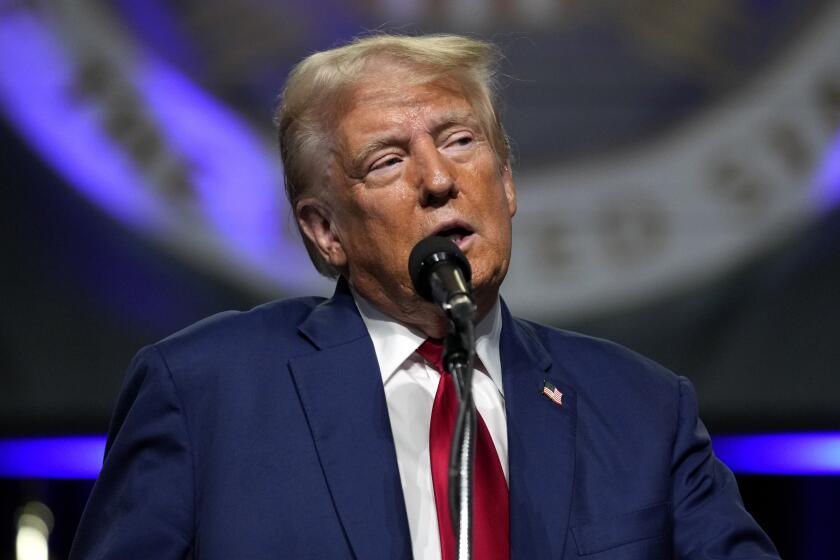State of the Union reply is chance for Rubio to shine
WASHINGTON — When Marco Rubio gives the official Republican response to the State of the Union speech, it will be a chance for the party’s fastest-rising star in years to impress millions of voters who have yet to form an opinion of him.
But along with the high-profile honor Tuesday night comes intense pressure. It could be particularly acute for Rubio, the first-term senator from Florida. Not only must he meet high expectations, but his speech must find a way to bridge serious splits within his party and, simultaneously, attract voters who have turned away from Republicans in recent elections.
“Folks are very concerned about the direction and future of the party. When they talk about Rubio, it seems to be with the hope that he has the capacity to put the party back together,” said Tom Rath, a veteran Republican in New Hampshire who advised Mitt Romney’s presidential campaign.
“I think folks like the idea of Rubio, but they do not yet understand what is the substance of Rubio. His challenge will be to convert that interest into advocacy and support.”
Younger looking than his 41 years, Rubio radiates an easy, boyish charm. His unexpected success in the 2010 election, knocking out a moderate Republican governor to win the Senate nomination, helped signal the emergence of the tea party as a national force.
Now, barely two years after arriving in Washington, he’s leading an effort to mend the GOP’s tattered relations with Latinos, a voting bloc crucial to the future of both major parties. He recently helped craft a bipartisan plan that would provide a path to citizenship for millions of undocumented immigrants — a stumbling block for immigration reform in recent years.
His roots as a son of working-class Cuban immigrants give him virtually unmatched credibility, for a Republican, among voters troubled by his party’s perceived hostility to Latinos. When he answers Obama’s address, he’ll do it twice — once in English and once in Spanish.
As he works to broaden his national reputation, Rubio has managed to avoid a backlash, so far, from conservatives. Many remain implacably opposed to any immigration solution that looks like amnesty for those who came to the U.S. illegally. But his aggressive outreach to conservative talk-show hosts and other media outlets closely followed on the right have helped mute opposition from hard-line critics.
Rubio has also left himself an escape hatch — conditioning his support for reform legislation on some sort of guarantee that the U.S. border with Mexico is secure enough for the plan to proceed.
At the same time, on other issues, Rubio has stuck with conservative Republican orthodoxy. He appeared on Fox News barely an hour after the start of Senate confirmation hearings on Chuck Hagel to announce that he would oppose the former Nebraska senator’s nomination for Defense secretary. He was one of five Republican senators to oppose the year-end “fiscal cliff” deal that included a tax increase for the wealthiest Americans. The deal would hurt economic growth, he said.
Support from the Republican right is crucial if, as expected, Rubio runs for president. But backing from the party’s conservative wing isn’t enough to get to a national majority, as seen in the results of November’s election, in which Romney won strongly among conservatives.
Political strategists in both parties will watch Rubio’s speech carefully to see whether he can avoid upsetting the party’s conservative base while still articulating Republican positions in ways that attract voters who spurn the GOP.
“Republicans win when they sound credible on economic issues and avoid sounding insensitive on cultural and social matters. Rubio’s very well placed to deliver both of those messages,” said Dan Schnur, a former Republican political consultant who directs the Jesse M. Unruh Institute of Politics at USC.
“If all he talks about is jobs and the deficit, he’s sacrificed an important opportunity for outreach. But if all he talks about is immigration, he’s almost certainly causing himself a problem with the Republican base,” Schnur said.
In addition to the substantive challenges, the response to a State of the Union speech involves a visual disadvantage. The speaker appears on television right after the grand spectacle of a president addressing a packed chamber of Congress. Often, the politician delivering the response — typically, alone in a room with a camera — comes off looking small, or worse.
All that would be daunting enough without expectations, which, at least since Rubio’s well-received speech on the final night of the Republican National Convention last summer, have been high.
“It’s a huge opportunity for him to really introduce himself as a player in national politics,” said Craig Robinson, a former Iowa Republican Party official. “People expect him to knock it out of the park. They want to believe. And so, if he can’t get to that high level, people are going to be a little disappointed and think that maybe he’s not the guy.”
Since November, Rubio has expanded his political operation and addressed a Republican fundraising event in Iowa, the earliest voting state in the presidential nominating contest. A recent poll of Republicans there ranked him first among potential presidential candidates. His standard response when asked about 2016 is to say, “If you do a good job at whatever your job is, you’ll always have a chance to do other things. Including things you never envisioned.”
But among some party activists, the interest in Rubio goes beyond the next presidential contest. His work on immigration has gotten the attention of those who understand how changing demographics pose a threat to their party, which has relied increasingly on a shrinking pool of white voters.
In that respect, Rubio’s speech is also a test of the theory that what ails the GOP is the messenger more than the message.
“Rubio himself would never say it, but his very existence at this level of politics argues that the challenge is both content and messaging,” Schnur said. “He doesn’t just talk about immigration using softer, sweeter language. He’s proposing a fundamental change in party orthodoxy, and he obviously and correctly believes that the party needs work on both substance and message.”
More to Read
Get the L.A. Times Politics newsletter
Deeply reported insights into legislation, politics and policy from Sacramento, Washington and beyond. In your inbox three times per week.
You may occasionally receive promotional content from the Los Angeles Times.










